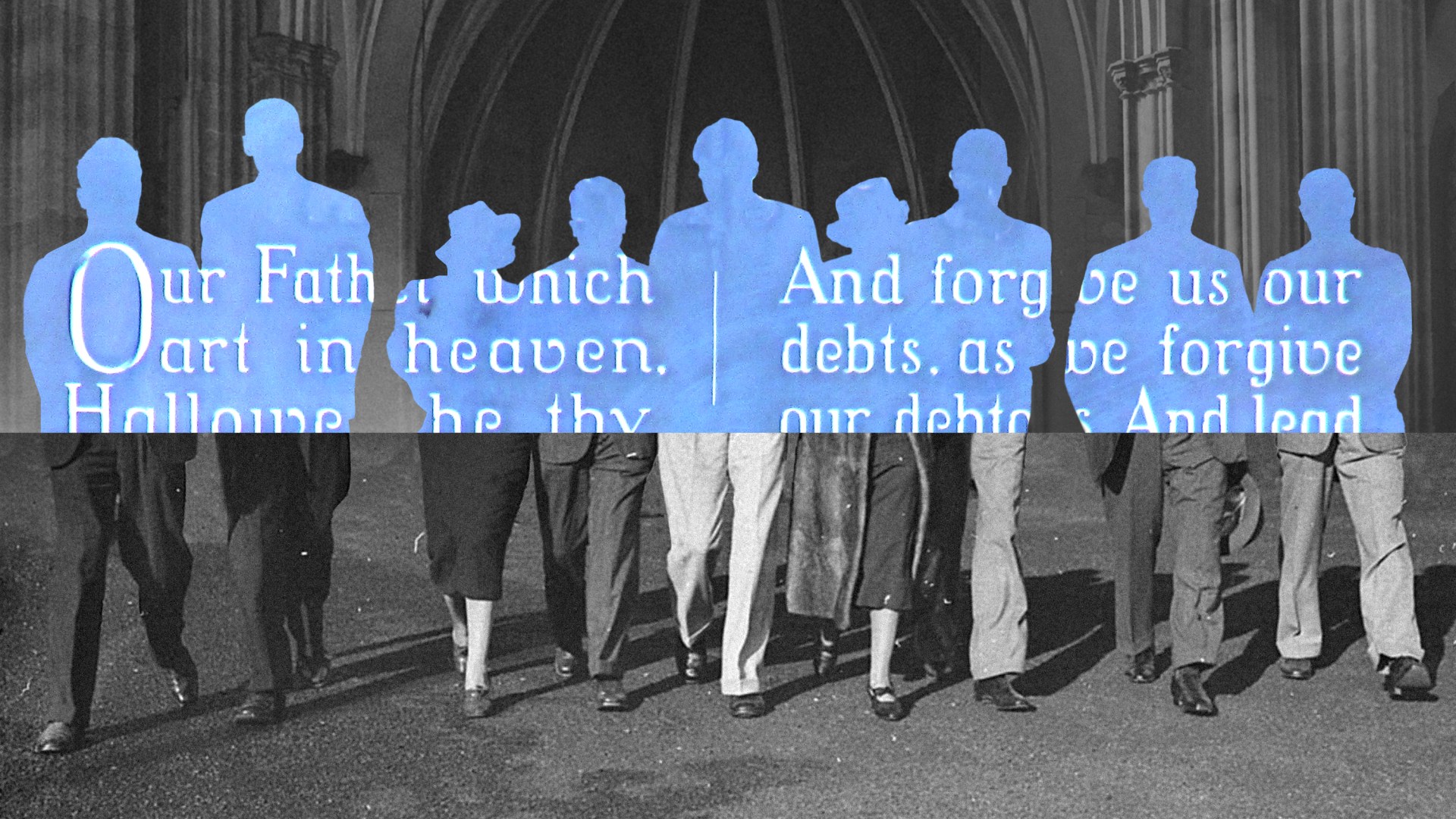The church today is divided, polarized by the many social and political factions vying for our attention and allegiance.
In the US, we’re emerging from a contentious election season in which many Christian voters felt strongly about their choice (whether to vote for a particular candidate or to abstain altogether) and expressed dismay at fellow Christians for choosing differently.
As we look toward gathering with believers who think very differently than we do—whether our fellow congregants at church or our friends or family members for the holidays—how can we aim to be agents of reconciliation instead of polarization?
Perhaps it starts with prayer; and specifically, learning the way Jesus taught us to pray.
The Lord’s Prayer is familiar to many, but I’ve been experiencing it with fresh eyes recently. Not only does it radically reorient and reform the community of saints as God’s people, but it undermines some of our persistently problematic ways of navigating life. Jesus’ prayer takes aim at our self-centeredness—including our rugged individualism, selfish ambition, and attempts to justify ourselves—replacing it with a bold invitation to belong to a countercultural community.
Let me show you what I mean.
Have you noticed the pronouns of this prayer? Instead of I, me, and my, the Lord’s Prayer tutors us to pray with collective pronouns: our and us. “Our Father” is the one to whom we pray (Matt. 6:9, emphasis added throughout). God is not my personal genie in a bottle, ready to grant my wishes. He is the divine parent in whose family every follower of Jesus finds a home.
To pray to God as our Father recognizes simultaneously that you are my sister or brother. Instead of thinking only of myself, I must immediately think of others.
It’s worth noting that in the first-century world, the sibling relationship was primary, exerting a strong force of loyalty—greater, even, than that of a marriage. Brothers and sisters were deeply committed to one another. Jesus redefines the boundaries of loyal commitment by speaking of the community of believers as a family.
One of his most startling teachings was the one that subordinated the concerns of his birth family to the family of faith: “Who is my mother, and who are my brothers? … Whoever does the will of my Father in heaven is my brother and sister and mother” (12:48, 50). If you and I are siblings in this newly formed family, then we bear a deep responsibility for one another.
This same message is emphasized in the rest of the prayer.
“Give us today our daily bread” (6:11). I do not pray only for my needs but for our needs to be met. Jesus’ prayer is for daily provision, the bread for this day. God does not guarantee a successful financial portfolio. He offers provision for today. This daily provision begins in the wilderness of Sinai, where God gave the Israelites manna—enough for each mouth, enough for each day.
Any extra manna collected would spoil because it wasn’t meant to be hoarded. It was meant to ensure that everyone had enough. This suggests that if I have more food than I need, I should participate in sharing to meet the needs of others. The Lord’s Prayer recognizes the urgency of daily food and makes us aware of and sensitive to the needs of others.
“Forgive us our debts” (v. 12). Not only does the prayer make us siblings who recognize our shared needs, but also it lumps together our respective liabilities. In other words, your debts are our debts. What I owe is what we owe. We share a collective responsibility for the harm we’ve done to others or for the promised goods we’ve withheld. The forgiveness Jesus urges us to pray for is no easy way out; it causes us to confront the consequences of our communal failures … together.
“As we also have forgiven our debtors” (v. 12). Together, we are called to forgive those who have harmed us or who have kept us waiting for what we are owed. There is a reciprocal relationship between the forgiveness we extend and the responsibility we have to follow through in our commitments to others.
The Lord’s Prayer undermines our self-centeredness by redefining us. If God is our Father and this is our food and these are our debts, then we’re meant to work all these things out together. Your neighborhood is my neighborhood, and I am your neighbor, no matter how far apart we might live. We are, in a sense, rightly entangled.
The prayer decenters us in other ways as well. “Hallowed be your name … Your kingdom come, your will be done, on earth as it is in heaven.” Jesus does not invite us to approach God with our plans and seek his stamp of approval. He affirms that God’s will is the one that should occupy our hearts and focus our energies. His name is the only one we must seek to honor.
Honor for God’s name undercuts our fantasies about the platforms, pulpits, penthouses, and political offices by which we can build our own kingdoms. The kingdom of God is the one we pray into being. Lord, let your kingship continue to exert its influence. Let your will be put into effect in our midst.
There’s no room for us to pursue personal power or to angle for our own agendas. All this is surrendered in our quest for God’s kingdom, God’s will, God’s glory, and God’s name. The kingdom of God will outlast any other, and it is the only one to which we owe our allegiance. In other words, we surrender our will so we can embrace God’s.
To be blunt, as a friend pointed out, every time we pray this prayer, we are ultimately praying for the end of America and every other nation-state on earth—because when God’s mission is finally accomplished on earth as it is in heaven, Christ alone will be ruler over all creation. All forms of human government will be dissolved, and we will bow at Jesus’s feet. What a powerful reminder in an election year!
For Jesus, this prayer was not simply lip service. When he prayed in the Garden of Gethsemane “Not my will but yours be done,” it cost him everything (Luke 22:42). It may cost us everything too. Jesus’ prayer is a powerful wake-up call for us to rethink our priorities and get to work doing what matters to God.
When Jesus prayed “Hallowed be your name” (Matt. 6:9), he surely understood that God’s reputation is attached to the people who bear his name. Throughout the Old Testament, we read of generations of covenant unfaithfulness who had seriously compromised the mission of representing God well among the nations.
In his prayer, Jesus demonstrates commitment to a life of holiness and righteousness—of living faithfully according to God’s commands—and he models how to fulfill our vocation. For God’s name to be revered, God’s people have to take seriously their mission to bear his name well (see Ezek. 36). How can we make God’s name holy? In the same way: by living according to God’s commands.
Jesus’ prayer closes with a fervent request to “lead us not into temptation.” We all depend on God to protect us from times of trial and testing. Our attitude should never be Bring it on! I’ve got this! Offering an antidote to our self-sufficient mindset, Jesus’ prayer recognizes our human vulnerability and calls upon God for protection.
He also prays for God to “deliver us from evil” (Matt. 6:13, ESV). This phrase can also be translated as “the evil one,” that is, the devil—whom Jesus himself faced during his temptation in the wilderness. But even in the more generic reading, “deliver us from evil,” scholar Daniel Block suggests we should read “evil” with the lens of Deuteronomy, where YHWH’s punishment would come “on account of the evil of your deeds, because you have forsaken me” (Deut. 28:20, NRSV).
The Old Testament repeatedly testifies that our greatest threat comes at us not from the outside but from within. In essence, Jesus prayed for God to rescue us from the evil of apostasy, especially given the impact on God’s reputation when his people are unfaithful. That’s what should motivate our prayer for protection.
We find ourselves in one of the most segmented and polarized times in modern history. It takes little to start a fight on social media, and it’s become increasingly difficult even to hold a civil conversation about our disagreements. Right now, the only thing succeeding in politics is cancel culture, and it’s happening on both sides of the aisle. The levels of angst and fear are alarming.
In this hostile environment, it can be easy for us as Christians to forget our purpose. As God’s image, we bear God’s name, and our mission is to represent God to the nations. We cannot do this if we are busy digging trenches and stockpiling weapons to use against the “other side.” We’ve got to be willing to cross the street, shake someone’s hand, and listen to their story.
Jesus’ remarkable prayer has the potential to heal our divided nation. It begins by decentering my needs and my agenda, forming instead a loving community in which we recognize shared needs and responsibilities. It resets our priorities by orienting us toward God’s kingdom and God’s name.
Instead of pointing out the faults of others, it cultivates an honest dependence on God by acknowledging our collective vulnerabilities in the face of universal temptations.
The Lord’s Prayer is so familiar that we often switch to autopilot when we pray it and so miss its weighty implications. But if we slow down and really think about what Jesus’ words mean and what they demand of us, something truly transformative can begin to take root.
In the wake of the recent election, what if Christians from across the political aisle were to kneel together and pray for God’s kingdom, God’s glory, and God’s name to be exalted in our nation?
Carmen Joy Imes is an associate professor of Old Testament at Talbot School of Theology and the author of Bearing God’s Name: Why Sinai Still Matters.















